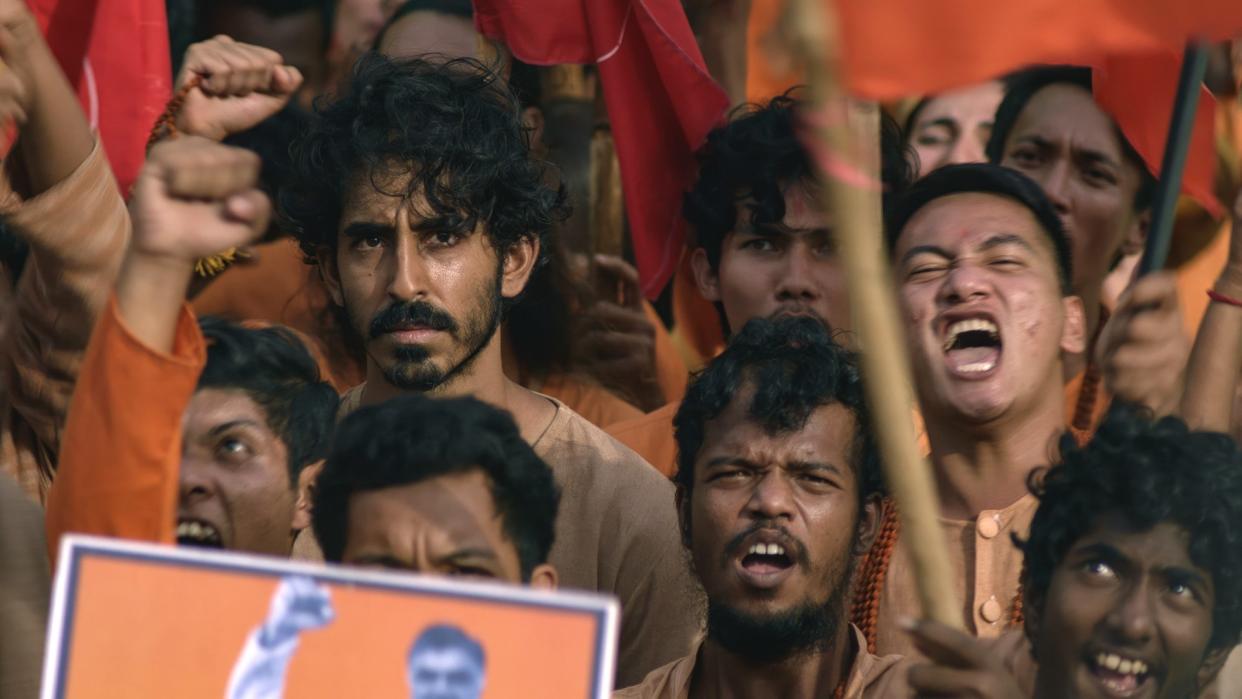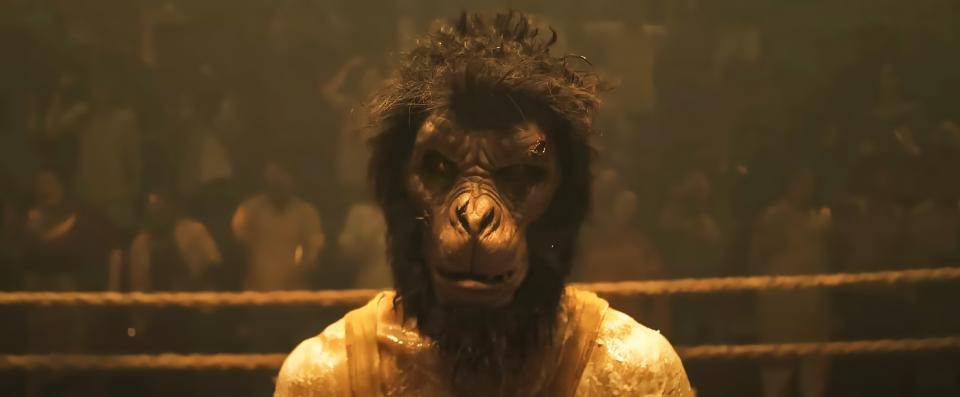Will ‘Monkey Man’ Even Be Released in India? An Uphill Battle with Censors Awaits — Opinion

- Oops!Something went wrong.Please try again later.
Despite broken limbs, financial strains, and a COVID-lockdown shoot, the biggest hurdle facing “Monkey Man” might be India’s Central Board of Film Certification, or the CBFC. Actor Dev Patel’s directorial debut, which is set in India, released in U.S. theaters on April 5, but faces an uphill battle with Indian censors because of its content. Specifically: Its violence, sexual imagery, and political and religious themes.
According to a previous listing on Indian ticketing site BookMyShow, Patel’s blood-soaked action-thriller was scheduled for an April 19 release but recent reports indicate that it will no longer make this date. (On Twitter/X, Universal Studios India touts the film as releasing “in cinemas soon” sans a specific release date). These reports also indicate that the delay could involve a lengthy editing process once the movie is screened for the CBFC, who, a source tells IndieWire, have not yet seen the movie.
More from IndieWire
The CBFC is a government entity that works according to India’s Cinematograph Act of 1952, and while it claims it isn’t technically involved in censorship — as this writer learned in a heated interview with one former CBFC chairman — the reality is more complicated. For a film to release in Indian cinemas, it needs to be granted one of three certificates: ‘U’ or ‘Universal’ (the equivalent of the MPA’s ‘G’ or ‘General’ rating for all audiences), ‘A’ or ‘Adult’ (the equivalent of an NC-17, applied to adults 18 and older), or ‘U/A’ (‘Universal/Adult,’ a more fluid rating somewhere between ‘R’ and ‘PG-13’). However, the Board can demand (or “suggest”) cuts and changes before granting a movie a more lenient certificate, or granting it one at all. The Board may not make cuts themselves, but they certainly ensure that studios and filmmakers self-censor.
For the most part, American studio films tend to release with minor changes, whether the muting of swear words, or awkward cuts around violence. For instance, Quentin Tarantino’s “The Hateful Eight” was nearly incomprehensible in Indian theaters, with the sound frequently dropping out, and characters who died violent deaths on-screen in the original simply disappearing from the story. However, there are political reasons for the CBFC’s “suggestions” too. Recently, Indian drama “2024 Election War” — whose title referred to India’s upcoming general election on April 19, but was changed to “Political War” to appease the Board — was denied a release because of its actors’ resemblance to Indian politicians.
For anyone who’s watched enough movies — Indian, American, or otherwise — after they’ve been through this censorious process, it’s tragically easy to predict the kind of objections that might be raised while watching a film like “Monkey Man.” For one thing, much of its action would likely be a no-go, thanks to the Board’s coddling when it comes to depictions of bloodshed. However, its sexual, religious and political content are likely to ruffle more feathers.
The MPA gave “Monkey Man” an ‘R’ rating for “strong bloody violence throughout, rape, language throughout, sexual content/nudity and drug use,” much of which is likely to be cut from the film should it release in India. The specifics involved will probably see eyebrows and objections raised from majoritarian groups with significant sway when it comes to boycotting movies. The film features an escort named Sita (Sobhita Dhulipala), who’s named after the goddess wife of Lord Ram, a revered figure in Hindu scripture. Patel’s story draws from the epic Hindu poem the “Ramayana,” but naming this character Sita comes with loaded implications for the country where sex workers still face violent discrimination, and where Hindu nationalists recently objected to a lion couple being named Sita and Akbar, because the former is a Hindu name and the latter is Muslim.
When it comes to protecting women onscreen, the sentiments of the CBFC can be strange and hypocritical. In 2017, the Board objected to depictions of verbal and physical abuse against women no matter the context, even in films that depicted this violence in order to condemn it. So, Patel’s scenes of sexual violence — for which the perpetrators are punished — will likely be called into question too. These scenes, coupled with frequent allusions to Hindu imagery, turn “Monkey Man” into a Molotov cocktail, at a time when the country’s religious sentiments have been especially heated (the rising tide of Hindu nationalism under Prime Minister Narendra Modi has seen frequent attacks on religious minorities, often for perceived slights against Hinduism).
In the film, Patel’s nameless character dons a monkey mask and molds his alter ego after the ape-like Hindu demigod Hanuman, another key character in the “Ramayana.” His framing of Hanuman is reverential, but this sort of innocuous appropriation has a precedent for censorship too. When the 2018 Marvel movie “Black Panther” was released in India, a line spoken by the tribal, ape-mask-wearing leader M’baku (Winston Duke), in which he proclaims “glory to Hanuman,” was muted. In some cases, mere depiction outside strict, traditional parameters is considered incendiary.

In other cases, disrespect toward religion and religious icons, even when framed negatively by a movie’s story, are treated similarly. Martin Scorsese’s 2016 drama “Silence” features scenes of Japanese Christians being forced, by the movie’s villains, to apostatize by insulting Jesus and Mary and stepping on their images. These instances, however, were muted and trimmed down for the Indian release. It’s hard not to imagine that the villains in “Monkey Man,” who use Hinduism and Hindu iconography as a front for nationalistic violence, might become an issue as well, especially if this is perceived as a critique of India’s current government. This is, of course, the objective of Patel’s framing (he goes as far as using real footage of anti-government protests), and in an era of foreign journalists being expelled for government criticism, it’s not impossible that these sentiments could carry over to Patel as well, a British actor making a foreign movie set in India.
The specter of Hindutva blowback has loomed over “Monkey Man” for some time. After its first trailer was released in January, revealing that the long-awaited Netflix production was now a Universal release, the film blog World of Reel reported that one of the reasons Netflix relinquished the film was because they didn’t want to release it in India, one of their biggest markets, for fears that it might upset Hindu nationalists. Since the release of this trailer, the posters for the villain’s political party, glimpsed briefly on screen, on screen have since changed color from saffron-orange — a color tied to both Hinduism and Hindu nationalism — to red, as seen in the second trailer as well as the final film. Universal declined to comment on this change, but it wasn’t long ago that the 2023 Bollywood blockbuster “Pathaan” came under fire for a “vulgar” saffron Bikini, while Universal’s own “Oppenheimer” faced blowback and threats of boycott in India for a scene involving the Hindu scripture the “Bhagavad Gita.” Many speculate that the change in the party’s color coding is an attempt to pre-empt and avoid Hindutva outrage, since it decouples the film’s fictitious religious extremists from their real-world equivalents.
“Monkey Man” might not make it to Indian cinemas in one piece if the studio capitulates to potential CBFC demands, and there is the possibility, given the movie’s themes and symbolism, that it may not be released in India at all. Streaming could potentially be a fallback if it doesn’t play in theaters, but companies like Netflix and Amazon have been increasingly giving in to India’s censorship demands. Patel’s critiques of religious extremism don’t always work, but like any artist, he deserved to have his say.
Best of IndieWire
The Best LGBTQ Movies and TV Shows Streaming on Netflix Right Now
Guillermo del Toro's Favorite Movies: 54 Films the Director Wants You to See
Nicolas Winding Refn's Favorite Films: 37 Movies the Director Wants You to See
Sign up for Indiewire's Newsletter. For the latest news, follow us on Facebook, Twitter, and Instagram.

